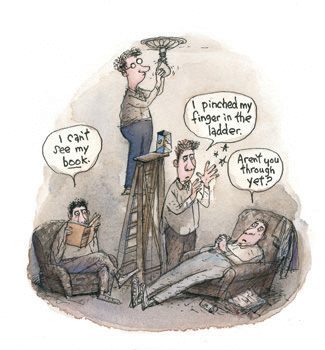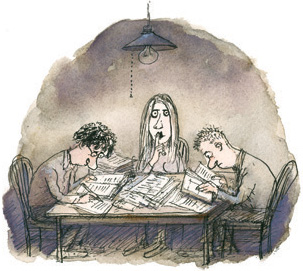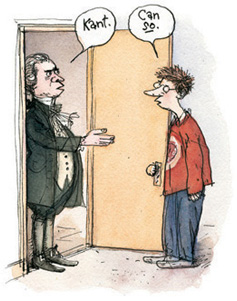And
the winning punch line is...
>> How
many U of C students does it take to change a lightbulb? To this
illuminating inquiry, Magazine readers provided answers that were
many and various.

There's
a glaring lacuna in the annals of lightbulb humor. The world has
long known how many Harvard students it takes to change a lightbulb
(One-he holds the bulb and the world revolves around him) and
how many Berkeley students (Seventy-six-one to change it, 50 to
protest the lightbulb's right to choose, and 25 to counter-protest).
But nowhere could the Magazine's editors find the answer
for Chicago. So we turned to our readers.
When
asking a Chicago grad a simple question, don't expect a simple
answer. Of the scores of responses, a fair number considered more
pressing matters, giving validity to the solution proffered by
Eleanor R. Smith, AB'85: "None-this is strictly a theoretical
school."
"What
is it we mean when we say 'change'?" pondered Edith K. Knowlton,
AB'71.
"Change it to what?" countered Michel P. Richard, AB'51,
AM'55. "We were taught to define terms."
Speaking
of terms: "The answer is pi-which is after all a circle of
inquiry divided by diametric perspectives composed of an infinite
number of points of reference," noted Nisan Chavkin, X'83.
"Of course," Chavkin continued, "the actual value
of p is still being calculated, so changing the lightbulb might
have to wait."
Some
readers did do the math. Jane Chapman Martin, AM'90, started by
dividing the question itself in two. First she calculated the
number of undergrads involved: "Four-one to change it, and
three to complain about how hard it was." Then she moved
on to the number of graduate changers: "One-but it takes
seven years."
That's
a clear gain over the line Teresa Davidian, PhD'88, heard lamented
on the quads in the 1980s: "One-it just takes ten years."
In
his reckoning of the count, Ben Ostrov, AM'77, PhD'87, reflected
Chicago's attention to the bottom line: "Ten-one to change
the bulb and nine to consider the economic feasibility of this
mode of illumination."
But
the grand prize-and with it the honor of having one's winning
punch line immortalized on a T-shirt to be awarded to everyone
whose response is printed here-goes to Paul L. Sandberg, JD'82,
MBA'82, who underscored the unblinking focus of true Chicago students
with his retort:
"Quiet!
We're studying in the dark."

In
an effort to up the ha-ha quotient, the Magazine gave readers
the chance to contribute to two other genres of low-brow humor.
Thus we can provide the following explanations of life at the
mind-body intersection. In other words, Why did the Chicago student
cross the road?
Again
theory takes precedence over fact:
"To
see if it would alter his/her consciousness in a determinate,
predeterminate, indeterminate, or non-determinate fashion,"
opined Rob Gushurst, AB'66, PhD'71.
No
one, however, was in doubt about the factual answer:
"To
get to the Reg. Of course." John G. Stackhouse, PhD'87; Steven
M. Meralevitz, AB'90; Vivienne J. Kattapong, AB'82, AM'84; and
H. Mark Delman, AB'84, MBA'92, all played variations on the library
theme.
Meanwhile,
Margaret W. Palu, AB'71, retooled a staple of Internet humor,
answering the old chicken-crossing riddle in the style of past
and present notables. For "chicken," she inserted "Chicago"
in some 50 one-liners, including Aristotle's "It's in the
nature of Chicago students to cross roads." Because she lives
in France, a good share of Palu's zingers had a French accent.
Take François Mitterand's petulant "Imbecile!
He crossed the road and got run over, just as I predicted."
And
although we asked for Maroon Knock Knock jokes, no readers seemed
willing or able to pun on their school color. Instead we offer
this, also contributed by road-crosser Mark Delman:
 Knock,
knock.
Knock,
knock.
Who's there?
Kant.
Kant who?
Kant you stop these terrible jokes?


![]()


 Knock,
knock.
Knock,
knock.